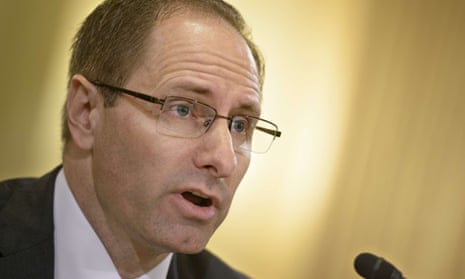The FBI has again waded into the debate around encryption, with the bureau’s assistant director of counterterrorism telling the US congress that tech companies should “prevent encryption above all else”.
Michael Steinbach, speaking at a hearing before the House Homeland Security Committee, explained how the the FBI uses technology to track and intercept supporters of Isis in the Middle East and elsewhere.
When Isis supporters communicate using social media, it’s easy for law enforcement to intercept: in one recent incident, the USAF boasted of “a post on social media to bombs on target in less than 24 hours”.
But when the communication is done through encrypted channels, rather than in public, the FBI and others have a much harder time intercepting it. That led Steinbach to appeal to the companies building encryption products.
“There are 200-plus social media companies. Some of these companies build their business model around end-to-end encryption,” Steinbach said.
“When a company, a communications company or a ISP or social media company elects to build in its software encryption, end-to-end encryption, and leaves no ability for even the company to access that, we don’t have the means by which to see the content”, he added.
“When we intercept it, we intercept encrypted communications. So that’s the challenge: working with those companies to build technological solutions to prevent encryption above all else.
“We are striving to ensure appropriate, lawful collection remains available.”
Steinbach insisted that he wasn’t asking for a “back door” to be built into encryption products, telling legislators that “we’re not looking at going through a back door or being nefarious.”
But security experts have long argued that the nature of encryption is such that there can be no middle ground between encryption which is unbreakable to all, including law enforcement, or encryption which contains some sort of flaw that can be used by anyone who knows of its existence, whether or not they are law enforcement.
An increasing number of communications products have “end-to-end” encryption, meaning even the company that produces the software can’t break the encryption on messages sent between its customers. Apple’s iMessage network and Facebook’s WhatsApp both use end-to-end encryption, for instance, while Google’s competing Hangouts product does not.
Steinbach’s comments echo those of his boss, FBI director James Comey, who in March asked Congress to pass a law that would force tech firms to create a backdoor in any tool that uses encryption.
“Tech execs say privacy should be the paramount virtue,” Comey said then, “When I hear that I close my eyes and say try to image what the world looks like where paedophiles can’t be seen, kidnapper can’t be seen, drug dealers can’t be seen.”
“To have a zone of privacy that’s outside the reach of law is very concerning,” Comey added.
In May, Apple, Google and other tech firms wrote an open letter to the Obama administration urging it to preserve strong encryption against pressure from agencies like the FBI.
The letter argued that “strong encryption is the cornerstone of the modern information economy’s security,” and that the government should “fully support and not undermine efforts to create encryption standards [nor] in any way subvert, undermine, weaken or make vulnerable” commercial software.

Comments (…)
Sign in or create your Guardian account to join the discussion